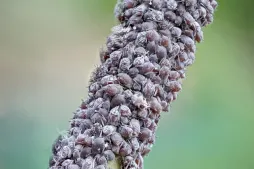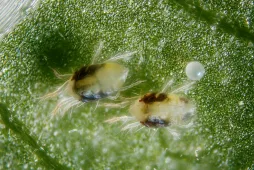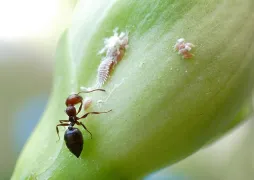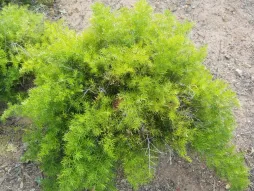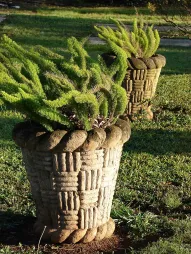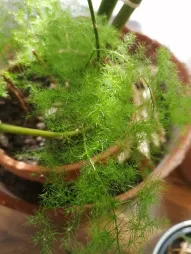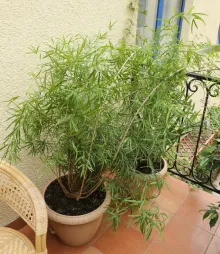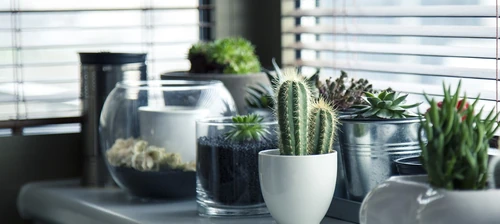Asparagus aethiopicus, Asparagus sprengeri
Botanists like to give plants names that come out of nowhere. Asparagus aethiopicus is a perfect example. This plant is native to South Africa, not Addis Ababa. And, although it belongs to the Asparagaceae family, it looks more like a fern than an asparagus. No wonder florists have renamed it! On their shelves, it's called Asparagus sprengeri or Asparagus de Sprenger.
How to recognize Asparagus sprengeri, Asparagus aethiopicus?
Smaller than asparagus falcatus, Asparagus aethiopicus reaches a meter in height. This perennial has an upright habit when young. Over time, its supple stems droop.
The stems bear spiny scales at each node. They are dotted at regular intervals with cladodes. These bright-green, oval twigs measure up to two centimetres long and two millimetres wide. They grow in rosettes, usually in groups of four, along the stem.
Sprenger's Asparagus blooms in summer. Clusters of white or pale pink flowers bloom on the stem.
If fertilization takes place, the flower develops into a fruit, a green berry that turns bright red when ripe. Inside is a black seed.
Birds love Asparagus aethiopicus fruit. But don't imitate them. The berry is toxic to humans, dogs, cats and most domestic animals. The plant can also cause skin allergies. Don't hesitate to wear gloves when pruning or repotting.
Our maintenance tips
Your Asparagus sprengeri needs light. But its delicate foliage cannot withstand the strongest sunlight. Indoors, place the plant behind a window screened by a curtain. Outdoors, prefer half-shade.
Watering
Asparagus sprengeri likes to keep its soil moist, but not soggy. Water when the potting soil has dried on the surface, over a centimetre.
Use room-temperature, low-limestone water. You can use rainwater, for example.
After watering, remove any excess water stagnating in the dish or planter. Asparagus sprengeri hates having its roots immersed in water.
Spray
Fogging helps to increase humidity and prevent attacks by mites or red spiders. Spray foliage with non-calcareous water at room temperature.
Repotting
In spring, transfer your Asparagus aethiopicus to a larger pot, so that it can continue to grow.
Choose a pot with holes larger than the root ball. Use a plastic pot rather than a terracotta one. This material retains more moisture. Moreover, the plant develops vigorous roots. It is not uncommon for them to break clay containers. Plastic is more resistant.
Pour a layer of potting soil for green plants at the bottom of the pot. Plant your subject in the center and fill in with substrate.
Press down and water generously to remove air bubbles.
Your Asparagus sprengeri doesn't like too dry an atmosphere. Place the pot on a dish filled with moist clay balls to improve humidity.
Fertilization
You can stimulate the development of your plant during its growth phase, in spring and summer, with fertilizer.
Apply green plant fertilizer once a month. Asparagus sprengeri is not a very greedy variety. Halve the dose recommended by the manufacturer.
Prune
Cut back older stems to one or two centimetres from the ground to encourage new branches.
Prune branches to balance shape and maintain a compact habit.
Plantation
Once the last spring frosts have passed, you can plant.
Choose a well-exposed location, away from direct sunlight.
Dig a hole about 25 centimetres deep. Place a layer of compost at the bottom to enrich the soil. Work the soil to loosen it. If necessary, add sand.
Plant your Asparagus sprengeri without burying the crown. Fill in and water to encourage rooting.
If you're building a bed, keep a 50-centimeter spacing between the various specimens.
Cutting
Cutting is carried out during the strong growth phase, generally in spring and early summer.
When repotting, divide the plant in two or three. Remove the soil from the roots to better locate the rhizomes. Using a clean knife or serpette, cut the roots. Be careful not to cut the tubers.
Obtain a perforated pot. Fill the bottom with potting soil for green plants.
Plant your cutting and fill with substrate. Tamp and water to remove air bubbles.
Diseases / Threats
Information
| Family | Asparagaceae - Asparagaceae |
| Type | Asparagus - Asparagus |
| Species | Ethiopian asparagus - Asparagus aethiopicus |
| Lifecycle | Perennial |
| Foliage | Evergreen |
| Exposures | |
| Substrat | |
| Planting methods |
Open ground In pots In tubs Planter |
| Categories | |
| Tags |
Beginner Toxic |
| Origin |
South Africa |
| Hardiness (USDA) | 11a |
| Leaf color |
|
| Flower colors |
|
| Fruit color |
|
Discover plants from the same family













